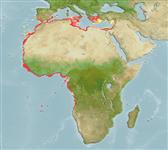Common names from other countries
Environment: milieu / climate zone / depth range / distribution range
पारिस्थितिकी
समुद्री; खारा ड़िमरसल; औशिनोड़िरोमस (Ref. 51243); गहराई सीमा 20 - 200 m (Ref. 3589). Subtropical; 39°N - 16°S, 17°W - 60°E (Ref. 54435)
Eastern Atlantic: along the west coast of Africa to southern Angola (Ref. 5222, 57293), including the southern Mediterranean (Ref. 5222). First record from Corsica, France in 2012 (Ref. 95840). Records from the Canary Islands and Cape Verde are unsubstantiated (Ref. 5222).
Length at first maturity / आकार / वज़न / Age
Maturity: Lm 55.0, range 50 - 60 cm
Max length : 120 cm TL पुल्लिंग / अलिंग; (Ref. 5222); common length : 60.0 cm TL पुल्लिंग / अलिंग; (Ref. 26999); अधिकतम प्रकाशित वज़न: 25.0 kg (Ref. 5222)
पृष्ठीय रीढ़ (सम्पूर्ण) : 10 - 11; पृष्ठीय सौफट रेज़ (सम्पूर्ण) : 14 - 16; गुदा कांटा: 3; ऐनल सौफट रेज़: 7 - 9. Diagnosis: depth of body less than head length, depth 3.0-3.6 times in SL; head length 2.5-2.9 times in SL; interorbital area convex; preopercle angular, 3.6- large spines at the angle, lowermost directed ventrally; posterior nostril slightly bigger than anterior nostril; maxilla reaches nearly to vertical at rear edge of eye; pelvic fin origin below base of pectoral fins; rounded caudal fin; body scales ctenoid (Ref. 89707).
Adults are found on rocky or mud-sand bottom; juveniles have been taken in coastal lagoons and estuaries (Ref. 5222, 57293). In the west African waters, diet comprise of fishes (58%), stomatopods (21%), crabs (10%), and cephalopods (10%). It is a protogynous hermaphrodite. The seasonal migration of the species off the coast of Senegal is influenced by the seasonal upwelling off Senegal and Mauritania. Utilized fresh and smoked (Ref. 9987). Highly esteemed in the market of West Africa (Ref. 5377).
Most females change sex at about 9 kg, but smaller males (of 3 to 5 kg) are occasionally found. Total potential fecundity was estimated to range from 789,436 ova in a 44 cm SL fish of 2.2 kg to 12,589,242 ova in a 87 cm SL fish of 12.6 kg. In Tunisia, sex change occurs at 10 to 13 years (6 to 15 kg, 80 to 110 cm TL).
Heemstra, P.C. and J.E. Randall, 1993. FAO Species Catalogue. Vol. 16. Groupers of the world (family Serranidae, subfamily Epinephelinae). An annotated and illustrated catalogue of the grouper, rockcod, hind, coral grouper and lyretail species known to date. Rome: FAO. FAO Fish. Synop. 125(16):382 p. (Ref. 5222)
IUCN Red List Status (Ref. 130435)
CITES (Ref. 128078)
Not Evaluated
Threat to humans
Harmless
Human uses
मात्स्यिकी: व्यापारिक; जलीयकृषि: प्रयोगात्मक; आखेट मत्स्य: हां
साधन
Special reports
Download XML
इंटरनेट स्रोत
Estimates based on models
Preferred temperature (Ref.
115969): 14.8 - 20.2, mean 17.1 (based on 122 cells).
Phylogenetic diversity index (Ref.
82804): PD
50 = 0.5000 [Uniqueness, from 0.5 = low to 2.0 = high].
Bayesian length-weight: a=0.01175 (0.01032 - 0.01338), b=3.04 (3.02 - 3.06), in cm Total Length, based on LWR estimates for this species (Ref.
93245).
Trophic level (Ref.
69278): 4.0 ±0.59 se; based on food items.
लौटाव (Ref.
120179): माध्यम, न्यूनतम जनसंख्या दुगनी होने का समय 1.4 - 4.4 वर्ष। (K=0.15-0.25; tm=5-7; tmax=17; Fec>1 million).
Fishing Vulnerability (Ref.
59153): High vulnerability (58 of 100).
Climate Vulnerability (Ref.
125649): Moderate vulnerability (45 of 100).
